#napoleon's ministers
Text
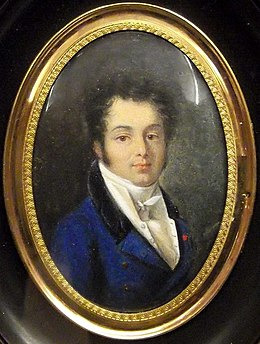

Guillaume-Joseph-Roux Peyrusse, Treasurer to Napoleon.
Peyrusse went to Elba with Napoleon, but when Napoleon wrote his will on St. Helena, he threw Peyrusse under the bus:
I had with the banker Torlonia from Rome, 2 to 300,000 francs in bills of exchange of my income from the island of Elba; Since 1815, the Sieur Peyrusse, although he was no longer my treasurer and had no character, drew this sum to himself: we will have it refunded to [the banker].
This terrible accusation was denied by General Bertrand, who testified with the Count de Montholon, the valet Marchand and Baron Fain, of the probity of Peyrusse. General Bertrand attributed this unfortunate codicil to a passing mood on the part of the Emperor at the end of his life. — Wikipedia
Napoleon III later gave Peyrusse honors to reverse this damaging accusation.
Napoleon used Peyrusse’s spyglass on the ship from Elba to France. It was discovered lying around somewhere and is now in an honored place in the museum at Carcassone.
More about Peyrusse (it’s in French)
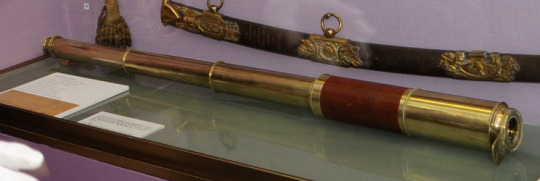
#napoleon's ministers#Guillaume Peyrusse#treasurer of the emperor#spyglasses used by Napoleon#Elba#St. Helena
19 notes
·
View notes
Text
Gaudin’s description of Napoleon

Martin-Michel Gaudin was Napoleon’s Minister of Finance. He entered the world of finance at the age of 17 and achieved the highest rank a non-aristocrat could achieve in finance administration pre-Revolution (“first clerk”). During the Revolution, he was the Commissioner of the National Treasury. He left government in 1795 and resisted further governmental recruiting attempts until Napoleon (who he had never met) approached him in 1799. Gaudin describes their first meeting in his memoir:
I found a personage who was known to me only by the high reputation he had already acquired; of low stature, dressed in a gray frock coat, extremely thin, yellow complexion, eagle-eyed, with lively movements [...] he came to me with the most gracious air.
“You have,” he said, “worked in finance for a long time?”
“Twenty years, General!”
“We need your help badly, and I’m counting on it. Come on, take your oath, we’re in a hurry.”
This formality completed, he added: “The last minister of the Directory will be informed of your appointment. Meet in two hours at the ministry to take possession of it, and provide a report on our situation as soon as you can, as well as on the first measures to be taken to restore the service which is lacking everywhere. Come see me this evening at my house on rue de la Victoire (that’s what rue Chantereine was then called), we will discuss our business more fully.”
I withdrew to carry out the orders I had just received.
(Source: Gaudin, Mémoires, souvenirs, opinions et écrits du duc de Gaète, pp. 45-46)
Historian Pierre Branda on their partnership:
“Intuition, good advice or genius? Bonaparte’s choice was judicious, because Gaudin would successfully occupy this ministerial post for the entire duration of the Consulate and the Empire, including the Hundred Days. With such longevity, he was undoubtedly one of Napoleon’s most appreciated ministers. It is true that the two men were often in perfect agreement.”
(Source: Le prix de la gloire: Napoléon et l’argent, pp. 197)
#Pierre Branda#Martin-Michel Gaudin#Gaudin#Napoleon#napoleon bonaparte#napoleonic era#napoleonic#first french empire#french empire#france#history#finance#economics#19th century#french history#minister of finance#1800s#Le prix de la gloire: Napoléon et l’argent#Le prix de la gloire#Napoléon et l’argent#description of Napoleon#description#Branda
60 notes
·
View notes
Text

Found a quote from Émile Dard’s «Napoleon and Talleyrand» about January 28, 1809 when Napoleon said that Talleyrand «Deserves to be broken by him like a glass» and took the shit way too seriously
#napoleon#talleyrand#napoleon/talleyrand#napoleon bonaparte#some kinky shit#everyone wanted to break their foreign minister right
42 notes
·
View notes
Text
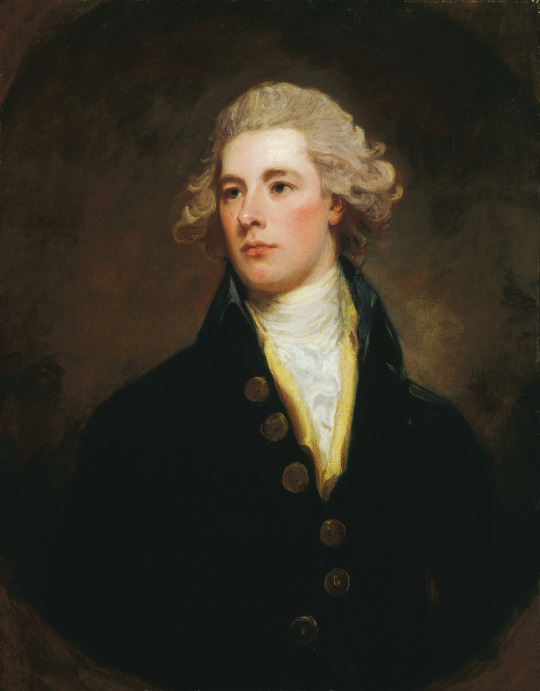
William Pitt the Younger by George Romney
#william pitt#william pitt the younger#art#portrait#george romney#england#great britain#prime minister#english#british#history#europe#french revolutionary wars#napoleonic wars#french revolution#georgian era#georgian
31 notes
·
View notes
Note
There is a new meme floating around TikTok and Reddit with Napoleon being whisked off to St. Helena and saying "There is nothing we can do." It is so sad.
It's very Not Cute, is what it is. Saint Helena is too small of an enclosure for a Napoleon to be happy! It's one of the reasons I made this blog; I learned about an infamous case of animal abuse of a Napoleon on Saint Helena, and I vowed "never again."

Actual video footage of me reading about a poor, helpless Napoleon being bullied by a mean-bean Hudson Lowe
11 notes
·
View notes
Text
I have lived in Belgium for three years now and I could barely tell you anything about it. This is obviously my own fault but like. It's genuinely so boring here.
#fitiaposting#I know the Prime Minister's name and I know the name of the streets and I can show you where Napoleon got his ass handed to him I guess but#otherwise? Girl where do I live
6 notes
·
View notes
Note
What's the beef with the Hungarians. genuine I like knowing foreign gossip
I cannot answer this without my historian mutuals' insight /j
It's the usual, though, i don't think it was that bad (???) but then again i'm not continental, so my beef is focused on italians. But there was also forced hungarisation here. I mentioned bân Jelačić specifically because he was staunchly against hungarisation or rather for the usage of the croatian language in croatia and development of our arts, and also because a joke I always repeat is "we have to turn (the statue of) ban Jelačić to face Hungary [threat]" whenever they start stirring some shit (like? Wasn't it last year when O.rban started making some sus statements about "Hungarians abroad" and how our sea should belong to them, as inspired by his daddy P.utin)
Basically it's a mix of austrohungarian politics that shouldn't matter today, but also the fact that i have heard shit like "coastal Hungarians" and. Whatever the hell O.rban was about tbh that just makes me go🤨 sometimes. Hungarians my beloveds, tho. Like with the French, I'm p sure they helped us more than they ruined us, I just hate them for the bit. You always gotta hate your neighbours a lil bit.
Tldr: it's not that deep, but i still hope the Hungarian who called me Albanian on here (bc I was talking about how people who call themselves expats just don't wanna equate themselves to "dirty immigrants" even tho they are immigrants, like, okay, i see what immigrants he had a problem with) stubs his toe once a week
#i love the French Marmont my everything Napoleon is the reason why we have potatoes and roads#and who could forget a name like Jean-Michel Nicolier? national hero. however.#same with Hungarians i vaguely recall my father telling me ab the fact that they actually smuggled us a lot of weapons when the war broke#out massive respect hearts and kisses and hugs to my neighbours. but your current president plays too much smh#you know what i mean? for me it's lighthearted. as in i know 99% of the people in this world are normal#and so when i say ''these damn Hungarians always starting shit''#it's more like a lil joke. in a similar way when i cry dalmatophobia when they don't allow me siesta time here#not that i actually believe in it but it's just ''oh okay i see. it's bc i'm [ethnicity] and you're [ethnicity] isn't it?!'' in a jokey way#tho idk maybe the continentals will have a different perspective#tho this is also how i view italians. my beloved brothers!! but your current prime minister is scaring me why is she irredentist#asks
5 notes
·
View notes
Text
Highlights From the October GMT Games Update
Highlights From the October @gmtgames Update
What’s this, on the horizon?
Is that a GMT Update post by Dave?
Does Dave really like a bunch of GMT games but just has had nothing really to say about the updates since June?
Does Dave really talk about himself in the third person?
Is Dave really full of himself that much?
Ahem…
Anyway, yes, it’s time for another GMT Update post regarding the monthly GMT newsletter, since I actually have…

View On WordPress
#A Gest of Robin Hood#Andean Abyss#Boardgames Chronicle#Commands & Colors: Medieval#Firefight: Tactical#GMT Games#I#I Napoleon#Norman Conquests: Men of Iron V#Players&039; Aid#Prime Minister#Rally the Troops#Solitaire TacOps: Ortona#The Last Hundred Yards Volume IV: The Russian Front
0 notes
Text
In fact, far more Asian workers moved to the Americas in the 19th century to make sugar than to build the transcontinental railroad [...]. [T]housands of Chinese migrants were recruited to work [...] on Louisiana’s sugar plantations after the Civil War. [...] Recruited and reviled as "coolies," their presence in sugar production helped justify racial exclusion after the abolition of slavery.
In places where sugar cane is grown, such as Mauritius, Fiji, Hawaii, Guyana, Trinidad and Suriname, there is usually a sizable population of Asians who can trace their ancestry to India, China, Japan, Korea, the Philippines, Indonesia and elsewhere. They are descendants of sugar plantation workers, whose migration and labor embodied the limitations and contradictions of chattel slavery’s slow death in the 19th century. [...]
---
Mass consumption of sugar in industrializing Europe and North America rested on mass production of sugar by enslaved Africans in the colonies. The whip, the market, and the law institutionalized slavery across the Americas, including in the U.S. When the Haitian Revolution erupted in 1791 and Napoleon Bonaparte’s mission to reclaim Saint-Domingue, France’s most prized colony, failed, slaveholding regimes around the world grew alarmed. In response to a series of slave rebellions in its own sugar colonies, especially in Jamaica, the British Empire formally abolished slavery in the 1830s. British emancipation included a payment of £20 million to slave owners, an immense sum of money that British taxpayers made loan payments on until 2015.
Importing indentured labor from Asia emerged as a potential way to maintain the British Empire’s sugar plantation system.
In 1838 John Gladstone, father of future prime minister William E. Gladstone, arranged for the shipment of 396 South Asian workers, bound to five years of indentured labor, to his sugar estates in British Guiana. The experiment with “Gladstone coolies,” as those workers came to be known, inaugurated [...] “a new system of [...] [indentured servitude],” which would endure for nearly a century. [...]
---
Bonaparte [...] agreed to sell France's claims [...] to the U.S. [...] in 1803, in [...] the Louisiana Purchase. Plantation owners who escaped Saint-Domingue [Haiti] with their enslaved workers helped establish a booming sugar industry in southern Louisiana. On huge plantations surrounding New Orleans, home of the largest slave market in the antebellum South, sugar production took off in the first half of the 19th century. By 1853, Louisiana was producing nearly 25% of all exportable sugar in the world. [...] On the eve of the Civil War, Louisiana’s sugar industry was valued at US$200 million. More than half of that figure represented the valuation of the ownership of human beings – Black people who did the backbreaking labor [...]. By the war’s end, approximately $193 million of the sugar industry’s prewar value had vanished.
Desperate to regain power and authority after the war, Louisiana’s wealthiest planters studied and learned from their Caribbean counterparts. They, too, looked to Asian workers for their salvation, fantasizing that so-called “coolies” [...].
Thousands of Chinese workers landed in Louisiana between 1866 and 1870, recruited from the Caribbean, China and California. Bound to multiyear contracts, they symbolized Louisiana planters’ racial hope [...].
To great fanfare, Louisiana’s wealthiest planters spent thousands of dollars to recruit gangs of Chinese workers. When 140 Chinese laborers arrived on Millaudon plantation near New Orleans on July 4, 1870, at a cost of about $10,000 in recruitment fees, the New Orleans Times reported that they were “young, athletic, intelligent, sober and cleanly” and superior to “the vast majority of our African population.” [...] But [...] [w]hen they heard that other workers earned more, they demanded the same. When planters refused, they ran away. The Chinese recruits, the Planters’ Banner observed in 1871, were “fond of changing about, run away worse than [Black people], and … leave as soon as anybody offers them higher wages.”
When Congress debated excluding the Chinese from the United States in 1882, Rep. Horace F. Page of California argued that the United States could not allow the entry of “millions of cooly slaves and serfs.” That racial reasoning would justify a long series of anti-Asian laws and policies on immigration and naturalization for nearly a century.
---
All text above by: Moon-Ho Jung. "Making sugar, making 'coolies': Chinese laborers toiled alongside Black workers on 19th-century Louisiana plantations". The Conversation. 13 January 2022. [All bold emphasis and some paragraph breaks/contractions added by me.]
456 notes
·
View notes
Note

So, I saw that you had no propaganda for the Iron Duke himself and thought that should be corrected, because I cannot let this man go unloved.
He is the ultimate sexyman. I don't really get that title or the requirements but I do know this man and he is the ultimate in Regency-era sexiness.
Field Marshal Sir Arthur Wellesley, First Duke of Wellington, whose full list of titles merits its own Wikipedia page, he had so many (including Prince of Waterloo of the Kingdom of the Netherlands), was so well known for his debonairness that he was often called "the Beau" or Beau Wellesley.
Our dear Duke with his eyes of "a brilliant light blue," is quite the underdog made good. The fourth son of an Anglo-Irish aristocratic family, he was a bit of a loner as a child, whose star was eclipsed by the academic success of his older and younger brothers. Yet he had a remarkable talent for the violin, which as we know from Mrs. Jefferson is quite a good quality for a man to have. As a young man he was considered extremely good humored and drew "much attention" from female society. The Napiers of Celbridge thought he was a "saucy stripling" and he was also considered quite mischievous. Yet he also had a rich inner life, reading and contemplating the great philosophers of the day.
Yes, we know about his military victories in the Peninsula (the position of Field Marshal of the British Army and the accompanying baton were created for him) and his success at Waterloo, but he was also both romantic and a ladies' man. (I could go on about the military success but that's not really what this is about, is it?)
Want the romantic side? He fell in love with Kitty Pakenham while a lowly aide-de-camp in Dublin but, with no real position or prospects, was laughed away by her brother when he sought to marry her. In a fit of pique he destroyed his violin and turned firmly toward progressing his career. Over a decade later, after he had made something of himself in India, he learned she hadn't married, supposedly because she was still pining for him. Reader, he married her, despite thinking she'd grown ugly, and got two children from her in less than two years. I'm not kidding, this man was virile. They married in April of 1806, their first son was born in February, 1807, and their second son was born in January 1808. Although he wasn't sexual faithful to her, Wellington wore an amulet she gave him for over twenty years, and was still wearing it when he sat with her on her deathbed. When she was surprised he still wore it, he told her if she'd just bothered to check in the last twenty years, she'd have found it. Despite surviving her by twenty years, the Duke never remarried.
Now, please don't think badly of him for the lack of sexual fidelity. It was the Georgian era. Sexual fidelity was not a part of marriage in high society. Men didn't sleep only with their wives and some wives could be quite happy with that (for one, it's much easier not to have one pregnancy after another when your husband is sleeping with someone else). Not that women weren't also sleeping around. Which brings me to one of Wellington's more... interesting conquests: Lady Caroline Lamb, wife of William Lamb (the future Second Viscount Melbourne and Prime Minister). Why do I know that name, you ask? The OG pixie manic dream girl, Caro's much more notably known for her affair with Lord Byron. After that particular bit of nonsense, she was in Brussels with the rest of the English aristocracy during the 100 Days/post Waterloo. She and the Duke supposedly slept together and she took his cloak away as a souvenir.
Who else did the Duke liaise with? Well, there were the usual flings with actresses and singers, such as La Grassini. As previously noted in another post on this tumblr, he was noted as a stronger, better lover than Napoleon by another of their mutual lovers. Wellington also was a client of Harriette Wilson. He visited her when she was in Paris after the Duke of Beaufort bought her off, though this was before Beaufort stopped paying her, prompting her to publish her memoirs. She canvassed her old lovers, including Wellington, to see if they'd pay her not to be in them. Wellington send her a note in return saying "Publish and be Damned." Something about his succinct dismissal of her is just so hot.
Oh, want a bit more of Wellington being a bad boy? In 1829, while Prime Minister, he got into a duel that still is commemorated almost two hundred years later. King's College, London, was set up while Wellington was also advocating for Catholic Emancipation and this led to Lord Winchilsea publicly insulting Wellington's honor to the point that the Duke (who'd never dueled before or supported dueling generally) called him out. They went to Battersea Fields and settled the matter with pistols. Wellington won and Winchelsea apologized. King's College celebrates "Duel Day" every March.
Even better, want to read about Elizabeth Bennet and the Duke being witty and falling in love? Complete with scenes of the Duke showing he knows what to do with his cannon? Then let me recommend the third variation of An Ever Fixed Mark, A Dalliance with the Duke. I dare you not to vote for him for all eternity with that portrayal in your head.
.
88 notes
·
View notes
Text

ON THE LEFT WE HAVE A NERD
WITHOUT HIM THE ENTIRE GRANDE ARMEE WOULD FALL APART!!!! HE ALSO GOT HIS MISTRESS TO LIVE IN THE SAME HOUSE WITH HIS WIFE BECAUSE HES JUST THAT GOOD AT DIPLOMACY AND HE HAD A CREEPY STALKER SHRINE TO THAT MISTRESS BEFORE HE WAS FORCED TO GET MARRIED
ON THE RIGHT WE HAVE A KING
I STILL HAVE NO FUCKING IDEA HOW A FRENCHMAN BECAME THE KING OF SWEDEN ALSO HES REALLY CLOSE WITH HIS MINISTER MAGNUS BRAHE AND APPARENTLY IT WAS REALLY SUSPICIOUS WHEN THEY WERE HAVING “POLICY MEETINGS” IN THE MIDDLE OF THE NIGHT IN BED
WHICH OF NAPOLEONS MARSHALS OF THE EMPIRE IS GOING TO WIN THE TITLE OF MOST PEOPLE CLICKING ON THEIR BUTTON???
LINKS TO SEE WHAT YOU MISSED OUT ON
MARSHALATE POPULARITY POLL
MARSHALATE PITY POLL
#napoleon’s marshals#jean-baptiste bernadotte#louis alexandre berthier#marshalate popularity ballot#marshalate popularity poll#dispatches from the marshal
49 notes
·
View notes
Text
Barracks talk from Napoleon
25-26 February 1814, Troyes, France.
Une certaine merveilleuse, Mme B…, avait reçu l’empereur Alexandre et avait donné une soirée ; enfin, après avoir reçu un cadeau de Sa Majesté, elle avait été conduite en pompe à Châtillon. Le pauvre mari a comparu devant Napoléon qui, en plein salon de service, a tourné en ridicule la conduite de sa femme, et lui a dit : « Que votre femme vous fasse c… [cocu] avec un de mes officiers d’ordonnance, à la bonne heure ; mais que ces messieurs, non contents de tout le mal qu’ils font à la France, viennent encore f…[outre] les femmes, c’est un peu fort !
--
A certain merveilleuse, Madame B…, had received Emperor Alexander and had given a party; so, after having received a present from His Majesty (Alexander), she had been conducted in pomp to Chatillon. The poor husband appeared before Napoleon who, in the middle of the service room, ridiculed his wife's conduct, saying to him: "If your wife cuckolds you with one of my orderlies, that’s all right; but that these gentlemen, not content with all the harm they're doing to France, even come here to f…[uck] the women, that’s a bit much!
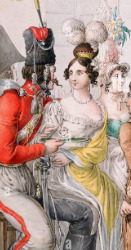
Guillaume Peyrusse, Mémoires, 1809-1815. Edition présentée et complétée par Christophe Bourachot, Editions AKFG, 2018 (link)
11 notes
·
View notes
Photo

Napoleon's Spanish War
“Atlas histórico de España”, Enrique Martínez Ruiz, Consuelo Maqueda Abreu, Emilio de Diego, Ediciones Istmo, 2016
by cartesdhistoire
For Napoleon, the Iberian Peninsula was a weak link in the southern flank of the continental blockade. In 1807, he sent Junot to occupy Portugal, where smuggling of British products was developing on a large scale. The presence of French garrisons on Spanish territory exacerbated the dynastic crisis which undermined power, torn between King Charles IV, Prime Minister Godoy and Infante Ferdinand. Napoleon deposes the Bourbons, exiled in France and replaced by Joseph Bonaparte. A popular riot broke out in Madrid on May 2, 1808, followed by fierce repression on the 3rd. The country was set ablaze, resistance was organized by politico-military juntas. French troops were defeated at Bailén, in Andalusia, in July 1808. Napoleon had to strip the eastern front to undertake costly reconquest operations.
In the years that followed, Spain became a gigantic battlefield. Spanish resistance is composite; a strong Catholic component gave the conflict the appearance of a crusade, while the politicians were divided between dynastic loyalty to the “legitimate” king, Ferdinand VII, and liberal aspirations which were expressed in the Constitution of Cádiz of 1812. The supporters of “Intruder king”, the “josefinos”, are isolated and only provide a semblance of authority under the cover of powerful military governors, Soult in the south, Suchet in the north. The French and their allies know how to play on the divisions of their adversaries, the liberals wary of the bands of partisans often supervised by priests and fanatically devoted to Ferdinand, whose absolutist tendencies are a mystery to no one.
It was the English expeditionary force commanded by Lord Wellesley, Duke of Wellington, hostile to the people's war, which ultimately decided the balance of power. In June 1813, the French army was crushed in Vitoria and had to evacuate the peninsula.
56 notes
·
View notes
Text

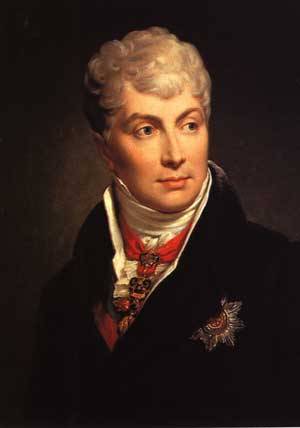
Kaunitz (or if you prefer, Kounicové): State Chancellor under Maria Theresa, Joseph II, and Leopold II from 1753 to 1793.
Moravian nobility known for such traits as: being petrified of illness, avoiding breathing Vienna's air when possible, womanizing so publicly that Maria Theresa told him to stop, orchestrating Marie Antoinette's marriage and dealing with Joseph II.
Prince Klemens von Metternich: Chancellor and Foreign Minister under Franz II/I and Ferdinand I from 1809-1848.
The man, the myth, the legend. Napoleon's slipperiest frenemy. Architect of the Concert of Europe and (allegedly) one of the sexiest men at the Congress on Vienna. He's also Kaunitz's grandson-in-law.
*We at the Best Habsburg Bracket neither confirm or deny whether we think these men are attractive. You can argue about it in the reblogs.
#best habsburg bracket#bonus polls#two bonus polls before the semi#welcome to austria where even the ministers are linked by marriage
54 notes
·
View notes
Text

French States Dinghy built in Antwerp in 21 days for Napoleon I in 1810, who had announced his intention to visit the mouths of the Scheldt and Antwerp's defense works. The Emperor only used this vessel once, on this occasion. It was over 18 meters long: the aft third was dominated by a spacious deckhouse designed to accommodate VIPs, while the oarsmen took up the rest of the space.
It was then transported to Brest and used a second time by Napoleon III in August 1858, when he visited the arsenal, and again in 1903, when the President of the Republic visited. In November 1922, it was launched again for the Minister of the Navy, Raiberti, on the occasion of the "Triumph of the Naval School".
Finally, in 1943, it was transported to the Palais de Chaillot in Paris.
66 notes
·
View notes
Text
“Is the Minister mad? or is he joking?”
— Napoleon about Fouché (letter to Cambacérès, 13 July 1808)
82 notes
·
View notes